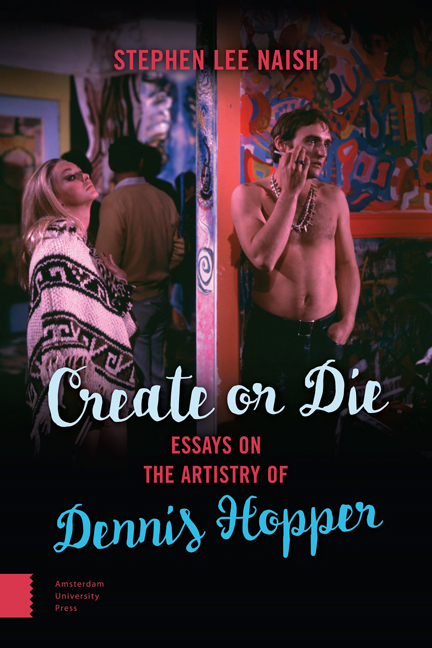Book contents
- Fronmatter
- Dedication
- Contents
- Introduction
- Scenes from a Revolutionary Life: How Dennis Hopper Conquered the American Century
- Hip-Hopp: Dennis Hopper and Music
- The Elephant in the Room: Dennis Hopper and American Politics
- Love and Hate: The Conflict of Emotions in The Blackout and Carried Away
- Commercial Breakdown: Dennis Hopper in the World of Advertisements
- White Light/White Heat: Actor and Character Collide in White Star
- Double Standards: The Art and Photography of Dennis Hopper
- Coda: The Fourth Wall
- Acknowledgements
- Notes
- Bibliography
Commercial Breakdown: Dennis Hopper in the World of Advertisements
Published online by Cambridge University Press: 11 December 2020
- Fronmatter
- Dedication
- Contents
- Introduction
- Scenes from a Revolutionary Life: How Dennis Hopper Conquered the American Century
- Hip-Hopp: Dennis Hopper and Music
- The Elephant in the Room: Dennis Hopper and American Politics
- Love and Hate: The Conflict of Emotions in The Blackout and Carried Away
- Commercial Breakdown: Dennis Hopper in the World of Advertisements
- White Light/White Heat: Actor and Character Collide in White Star
- Double Standards: The Art and Photography of Dennis Hopper
- Coda: The Fourth Wall
- Acknowledgements
- Notes
- Bibliography
Summary
Film actors, directors, and celebrities often make a convenient sideline in advertisements and product endorsements. When a break in the acting schedule allows for an all-expenses-paid excursion, many of them venture afar in pursuit of a big payday for very little work. This facet of celebrity is explored in director Sofia Coppola's film Lost in Translation (2003). Bob Harris, played to cynical perfection by Bill Murray, is an ageing Hollywood movie star suffering an existential crisis whilst filming an advertisement campaign for Suntory Whiskey in Tokyo, an engagement that will pay him a handsome two million dollars. Although this film is fictional, the situation is very much based in reality. Sofia Coppola chose Suntory Whiskey for Harris to promote because her father, director Francis Ford Coppola, also endorsed the same drink for the Japanese market in the late 1970s.
The internet is spilling over with bizarre foreign advertisements that were never meant for Western consumption and so fail to sell the idea of the product to a more reserved consumerist market. Television commercials featuring American actors produced for the Japanese market take on a surrealist, madcap vibe. One extreme example is actor Nicolas Cage’s extravagant and exuberant commercials for Pachinko, a Japanese arcade game. Cage is well-known for his off-the-wall acting style in a majority of his films, but in these adverts he goes beyond insanity. In a series of Pachinko commercials, Cage sings an improvised song at a grand piano, gets aroused in a cartoonish fashion by the prospect of bedding triplets, and dances on a highway with a legion of alien spacemen. The advertisements add a completely new dimension to Cage's already well-documented extrovert tendencies. Cage is not alone in infiltrating the Japanese market. A whole host of A-list celebrities have left their dignity in the West to make some quick and easy money. Harrison Ford sold Kirin Lager Beer, Sean Connery sold yogurt, Brad Pitt sold jeans, and Paul Newman sold coffee. In 1995, Dennis Hopper himself boarded this particular crazy train. A thirty-second advert promoting a Japanese cleaning product called Tsumura saw Hopper belly deep in a bubble bath playing with a wind-up rubber duck and cackling like a lunatic. However, what looks like indignity and lunacy to us in the West is enthusiastically received in the Asian market and often proves to be a commercial success.
- Type
- Chapter
- Information
- Create or DieEssays on the Artistry of Dennis Hopper, pp. 71 - 78Publisher: Amsterdam University PressPrint publication year: 2016



